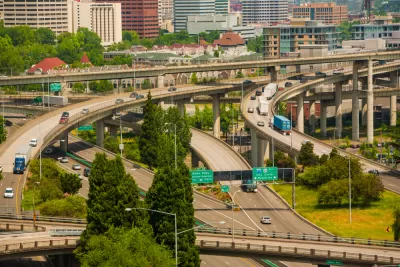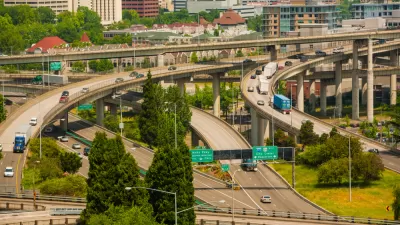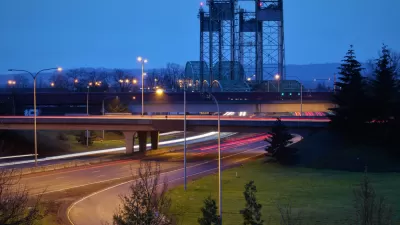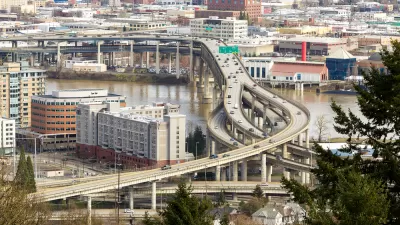A Portland regional value pricing committee recommended that the state transportation department operate two pilot programs to toll all the lanes on two interstate highways in the Portland-Vancouver metropolitan area.

The Portland Metro Area Value Pricing Advisory Committee issued its final recommendation on July 5 to the Oregon Transportation Commission on the tolling of Interstates 5 and 205 in the Portland region as required by transportation funding legislation passed last year, House Bill 2017. It recommends two pilot projects on Interstates 5 and 205 to be performed in phases, reports Nate Hanson for KGW-TV.
As posted in May after the committee released three preliminary recommendations, both pilot projects would apply value pricing, i.e., a variable toll based on the level of congestion, to all the lanes, rather than pricing a single or double high occupancy toll (HOT) lane or express lane, so all motorists would be subject to the toll.
It was not clear if carpools or clean air vehicles would be exempt from the toll as is widely practiced elsewhere. According to a letter to the Oregon Transit Commission by advisory committee member Bernie Bottomly of Tri-Met, the Portland regional transit agency, "the goal of congestion pricing is to get the most out of the existing system by encouraging some people to travel at less congested times or to choose a mode such as transit, carpool, bicycle, or walking instead." The letter is included in committee's final report: "Portland Metro Area Value Pricing Feasibility Analysis / FINAL Policy Advisory Committee Recommendation to the Oregon Transportation Commission" [pdf].
The first phase of the pilot project would apply to specific stretches of I-5 and I-205, while the second would toll the entire length of both freeways, adds Hanson.
“What we have seen around the country and world is these tolling options make congestion better,” said Oregon Department of Transportation [ODOT] spokesman Don Hamilton. “When people take different options to go to work to avoid paying the toll, things ease up for everybody else, you're going to pay something but you'll get something very valuable in return: a better trip.”
On most roads where congestion or value pricing is used, particularly on interstate highways, it is applied to single or double express lanes adjacent to unpriced, general purpose lanes, so motorists retain the option to travel toll-free, albeit at slower speeds during congestion, on the highway. A major exception is the 66 Express Lanes Inside the Beltway in Northern Virginia, although pricing is only applied during peak weekday hours in the morning and late afternoon. During other times, all lanes operate toll-free.
The advisory committee held several public meetings to gather input from the region, which includes Vancouver, Wash., across the Columbia River. One final meeting will be held on July 12 to solicit input on the final recommendation before ODOT "submits a tolling proposal to the federal government by the end of the year," adds Hanson.
As noted here in May, adding tolls to all lanes of an existing interstate highway, as opposed to adding a new toll lane or converting an existing lane, generally a carpool lane, to a HOT lane, is prohibited by the Interstate Highway Act of 1956. States must request waivers from the Federal Highway Administration.
"Because this concept would implement pricing on currently unpriced lanes, it would require approval under the FHWA Value Pricing Pilot Program," states the final report on pg. 18/149.
As previously posted, Indiana and Connecticut may also be pursuing similar projects that would toll all lanes of interstate highways.
Hat tip to IBTTA Smart Brief.
FULL STORY: Tolling on I-5 and I-205 recommended to ODOT

Alabama: Trump Terminates Settlements for Black Communities Harmed By Raw Sewage
Trump deemed the landmark civil rights agreement “illegal DEI and environmental justice policy.”

Planetizen Federal Action Tracker
A weekly monitor of how Trump’s orders and actions are impacting planners and planning in America.

Why Should We Subsidize Public Transportation?
Many public transit agencies face financial stress due to rising costs, declining fare revenue, and declining subsidies. Transit advocates must provide a strong business case for increasing public transit funding.

Understanding Road Diets
An explainer from Momentum highlights the advantages of reducing vehicle lanes in favor of more bike, transit, and pedestrian infrastructure.

New California Law Regulates Warehouse Pollution
A new law tightens building and emissions regulations for large distribution warehouses to mitigate air pollution and traffic in surrounding communities.

Phoenix Announces Opening Date for Light Rail Extension
The South Central extension will connect South Phoenix to downtown and other major hubs starting on June 7.
Urban Design for Planners 1: Software Tools
This six-course series explores essential urban design concepts using open source software and equips planners with the tools they need to participate fully in the urban design process.
Planning for Universal Design
Learn the tools for implementing Universal Design in planning regulations.
Caltrans
Smith Gee Studio
Institute for Housing and Urban Development Studies (IHS)
City of Grandview
Harvard GSD Executive Education
Toledo-Lucas County Plan Commissions
Salt Lake City
NYU Wagner Graduate School of Public Service





























